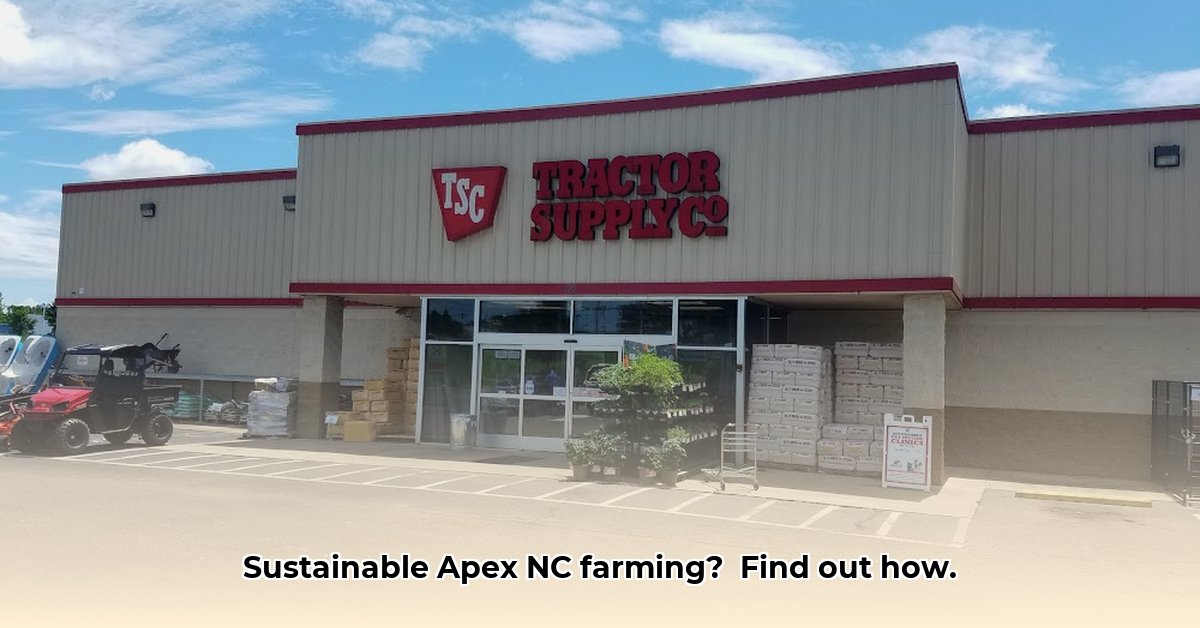
Tractor Supply Apex NC: Your Partner in Sustainable Farming
Dreaming of a thriving, eco-friendly farm in Apex, North Carolina? Tractor Supply Company (TSC) in Apex can be a valuable resource in your sustainable agricultural journey. It offers a surprising range of products for all farming needs, from large-scale operations to home gardeners. But how effectively does TSC support sustainable practices? Let's explore. For more local information, visit the Apex TSC page.
Stocking Your Sustainable Farm: What Tractor Supply Apex NC Offers
TSC Apex stocks a wide variety of products beyond tractors. Need chicken coops? Organic seeds? Watering troughs? They likely have what you need to implement various sustainable farming practices. However, a crucial point needs addressing: assessing TSC's own sustainability commitment. How eco-friendly is the company itself? More transparency regarding their carbon footprint and sourcing practices is needed.
Sustainability at Tractor Supply Apex NC: The Big Picture
Determining Tractor Supply's overall environmental impact is challenging due to a lack of readily available data on their carbon footprint and product sourcing. This transparency gap is a significant concern for environmentally conscious consumers. While TSC indirectly supports sustainable food production by supplying smaller farms, more information is crucial for a complete picture. This lack of data may raise a critical question: How can we trust their sustainability claims without concrete evidence?
Your Action Plan: Building a Sustainable Farm with Tractor Supply
Here's a step-by-step guide to building your sustainable farm using TSC resources:
- Define Your Goals: Before shopping, clarify your sustainable farming objectives (e.g., organic production, permaculture). This guides your purchasing choices.
- Prioritize Organic: At TSC, prioritize organic seeds and fertilizers whenever possible. Small choices have a cumulative positive impact.
- Reduce Waste: Only purchase what you need to minimize waste. Compost food scraps and choose products with minimal packaging.
- Conserve Water: Invest in efficient irrigation systems and consider rain harvesting techniques. TSC may offer relevant equipment.
- Boost Biodiversity: Plant wildflowers to attract pollinators and encourage natural pest control. A diverse ecosystem is a resilient one.
- Continuous Learning: Stay updated on sustainable farming best practices through workshops, research, and ongoing education.
Challenges and Solutions: Navigating the Ups and Downs of Sustainable Farming
Sustainable farming presents challenges. Let's examine some risks and mitigation strategies:
| Challenge | Potential Impact | Solutions & Mitigation Strategies |
|---|---|---|
| Reliance on Conventional Inputs | Environmental harm, reduced soil health | Prioritize organic alternatives. Thoroughly research suitable options for your specific needs. |
| Livestock Waste Management | Pollution, odor, potential disease | Implement robust waste management plans, exploring methods like anaerobic digestion or composting. |
| Supply Chain Transparency | Uncertainty about ethical sourcing | Advocate for greater transparency from TSC and other suppliers. Choose brands with strong sustainability commitments. |
Going Beyond the Store: Your Role in a Sustainable Future
Sustainable agriculture requires a collective effort. Your actions matter. Support local farmers' markets, advocate for sustainable policies, and educate your community. Every step contributes to a greener future.
How to Measure Tractor Supply Company's Impact on Sustainable Agriculture
Key Takeaways:
- TSC's sustainability reports are a starting point, but their lack of detail hinders precise impact measurement.
- Data transparency is essential for an objective assessment of TSC's sustainability contributions.
- Various stakeholders (farmers, investors, regulators) use different approaches to evaluate TSC's efforts. A multi-faceted approach is required.
Understanding Tractor Supply's Role
TSC's role in sustainable agriculture depends on access to and analysis of their sustainability reports. These reports hint at a broader commitment, but concrete data on product sales of sustainable options, supply chain emissions, and community engagement programs is needed for a comprehensive understanding.
Challenges in Measuring Impact: The Data Gap
The lack of detailed, readily available data makes objective measurement difficult. We need concrete evidence, not just the existence of sustainability reports. This data scarcity hinders a true understanding of their environmental impact.
Who Should Be Measuring, and How?
Multiple stakeholders have a vested interest in measuring TSC's impact:
| Stakeholder | Measurement Approach | Challenges |
|---|---|---|
| TSC Itself | Internal audits, life cycle assessments, supply chain tracking | Potential bias in self-reporting, data access limitations |
| Farmers | Assessing TSC's product offerings; observing farming changes | Difficulty isolating TSC's influence from other factors |
| Investors | Analyzing ESG reports, comparing TSC to competitors | Data limitations, differing ESG standards across companies and industries |
| Regulators and NGOs | Evaluating compliance with environmental regulations; audits | Resource constraints, political influences |
A Multi-faceted Approach
Effective measurement requires a multi-pronged approach: analyzing TSC's reports, conducting farmer surveys, and implementing long-term monitoring. It's a holistic assessment, not a single metric.
Looking Ahead: What We Need
For effective measurement, TSC needs to increase transparency, providing detailed, public data on their efforts to reduce their environmental footprint and support sustainable agricultural practices. This detailed information is critical for understanding their true sustainability impact.